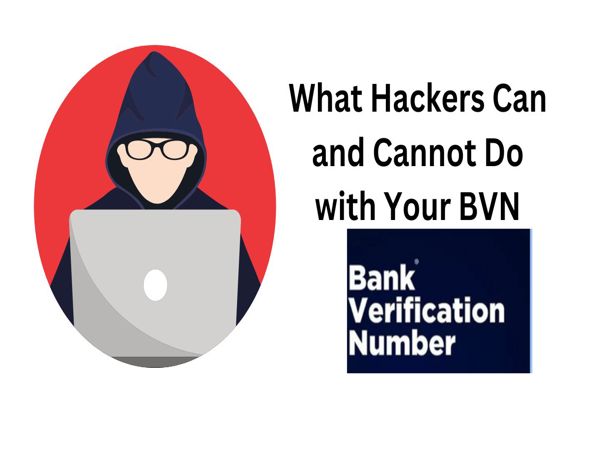It was a warm Monday morning when John received an alarming text from his bank, “Dear customer, your BVN has been flagged due to suspicious activities. Please click the link below to update your information.” Panicked, he clicked on the link and entered his bank details, unaware of the storm he had just walked into.
The Bank Verification Number (BVN) was introduced in Nigeria to safeguard against fraud by ensuring each bank account is linked to an individual’s unique identifier. But like all systems, it isn’t without its vulnerabilities when mishandled. The purpose of this story is to explain what hackers can and cannot do with your BVN, and how you can protect yourself from falling victim to such schemes.
What Hackers Can Do with Your BVN
1. Identity Theft
Just like John, hackers can use your BVN to gather more personal details about you. By knowing your BVN, they can access information like your name, address, phone number, and date of birth.
But, what happens next is more sinister. Once they have this personal information, hackers can:
- Open bank accounts in your name.
- Apply for loans or credit facilities on your behalf.
- Register SIM cards for illegal activities.
Step-by-step solution:
- Always be cautious of unsolicited messages, emails, or calls requesting your BVN.
- Regularly check your credit reports to catch any signs of fraudulent activity.
- Contact your bank immediately if you suspect your details have been compromised.
2. Loan Fraud
Hackers can exploit your BVN to take loans on your behalf. Many fintech apps and banks rely on your BVN for identity verification before disbursing loans. If a hacker has your BVN and some other details, they can apply for loans using your identity.
Step-by-step solution:
- Monitor your accounts regularly for suspicious transactions.
- Set up SMS or email alerts for every transaction that happens with your bank account.
- If you notice any unauthorized loans, report them immediately to the bank or financial institution.
3. SIM Swap Fraud
This is a particularly dangerous trick. Once a hacker has your BVN and some additional personal data, they can impersonate you and request a SIM swap. With control over your phone number, they can:
- Intercept One-Time Passwords (OTPs) and security alerts from your bank.
- Change the passwords to your email, bank apps, and social media accounts.
Step-by-step solution:
- Set up two-factor authentication (2FA) for your banking apps using a secure app like Google Authenticator instead of SMS.
- Always visit your mobile provider physically to verify your identity before approving any SIM card change.
- Keep track of sudden loss of mobile network signal, as this can indicate a SIM swap in progress.
4. Phishing Attacks
Once hackers have your BVN, they can send you phishing messages pretending to be from your bank or a government agency. They’ll ask you to “update” your BVN or provide other sensitive details that can lead to a larger breach.
Step-by-step solution:
- Be skeptical of any message requesting you to “update” your BVN. Always verify directly with your bank through official channels.
- Avoid clicking on links sent to you via SMS or email unless you are sure of their origin.
5. Creating Fake Bank Accounts
Cybercriminals may use your BVN to create fake bank accounts for illegal activities, such as money laundering or scams. They can open accounts in your name without your knowledge, linking these accounts to illicit transactions.
6. Insurance Fraud
If they obtain enough information, hackers can commit insurance fraud, like filing false claims in your name or taking out insurance policies on your behalf. They could potentially benefit financially while leaving you liable.
7. Targeted Social Engineering
Having your BVN makes it easier for fraudsters to pose as legitimate organizations or financial institutions. They may attempt to contact you, pretending to be from your bank, and manipulate you into revealing more personal details or performing actions that compromise your accounts.
What Hackers Cannot Do with Your BVN
Despite the potential risks, there are a few things hackers cannot do with just your BVN.
1. Directly Steal Funds from Your Account
Your BVN alone cannot grant a hacker direct access to your bank account. The BVN is essentially a number that identifies you across financial institutions. It does not contain your bank details, PIN, or login information.
For instance, John was worried that the hackers would drain his account immediately after stealing his BVN. However, this didn’t happen right away because the hackers still needed more sensitive details like his ATM PIN, OTP, or banking password.
Step-by-step solution:
- Keep your banking passwords, PINs, and OTPs confidential.
- Enable biometric authentication for transactions, if available.
2. Bypass Your Bank’s Security Features
Most financial institutions in Nigeria require multiple levels of authentication before carrying out transactions. While a hacker might have your BVN, they will still need to bypass layers of security like your OTP or 2FA to access your funds.
Step-by-step solution:
- Always keep 2FA active for all your financial services.
- Use strong, unique passwords for your banking apps and accounts.
Final Thoughts: How to Stay Safe
Hackers are getting smarter, and it’s crucial to remain vigilant. John learned the hard way that his BVN is not just another number. It’s a key identifier that, if misused, can lead to identity theft and other forms of financial fraud.
However, by following these step-by-step solutions, you can stay ahead of the hackers:
- Keep your BVN confidential – Only provide it to authorized personnel or financial institutions.
- Use two-factor authentication (2FA) – This adds an extra layer of security to your accounts.
- Report suspicious activity immediately – The faster you act, the better chance you have of stopping fraud in its tracks.
Always remember, hackers thrive on the gaps in our vigilance. Don’t give them that opportunity.

.jpg)







